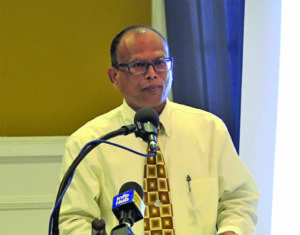In reemphasising that countries will be downgraded for failing to have a risk-based approach, Attorney General Basil Williams said that financial and other agencies should be proactive as the country works towards strengthening existing Anti-Money Laundering (AML) mechanisms.
Williams made this call while addressing Guyana’s Money Laundering/Terrorist Financing National Risk Assessment seminar, which was officially opened on Wednesday at the Georgetown Club, Camp Street, Georgetown.


Williams, also the current Chairman of the Caribbean Financial Action Task Force (CFATF), urged institutions to work assiduously. The AG said Guyana has to demonstrate that it has an effective anti-money laundering regime and can deliver on the 11 Financial Action Task Force (FATF) outcomes, which are based on 40 recommendations outlined by the international body.
“We need to execute action plan items and formulate strategies to strengthen our sectors. There must be effective information sharing at both the national and international levels, as this facilitates the detection and prevention of terrorist financing and money laundering and must be central to our regime,” he said.
Based on the local National Risk Assessment, the overall money laundering risk was ranked as medium to high, while terrorist financing was ranked as medium. The AG said individual agencies, such as the Financial Intelligence Unit (FIU), have assessed their risks and are working to strengthen them.
He said, “All reporting entities and other designated financial businesses and professions must be effectively supervised to ensure their compliance with the [Anti-Money Laundering and Countering Financing of Terrorism] AML/CFT laws. Supervisors need to become more active in their supervision functions by providing training, on-site visits and ensuring that their respective agencies comply with the AML/CFT laws.”
Williams reminded participants of the seminar that money laundering was a global problem that affected the stability and prosperity of any country. He said this meeting was a follow-up to the National Risk Assessment conducted in 2016/2017. It will provide a roadmap for the next steps to be taken as Guyana prepares for an assessment by the FATF in 2022.
Meanwhile, Director of the Bank of Guyana (BoG) Bank Supervision Department, Ramnarine Lall told the seminar that cambios and money transfer entities would come under the microscope shortly, stating that risk-based supervisory approach for money transfer services and cambios as they relate to money laundering and terrorist financing would be completed by year end.
He said, “The Bank Supervision Department was given the responsibility because we recognise that money transfers and cambios are high risk, based on the National Risk Assessment; we wanted to put them under proper supervision and intensive supervision.”
Lall also disclosed that the Central Bank was finalising a guideline to supervise money transfer services and cambios, following on from revised guidelines for banks and non-banks that were completed in June. According to him, the supervisory authority could go as far as customer due diligence if someone frequently transfers monies from Guyana to countries that are listed on terrorism watch lists.
Williams said the risk-based approach to money laundering and terrorist financing would allow Guyana to place greater attention to high risk areas. “It’s very important and that’s why everyone has to be engaged, including the Ministers and Ministers in Cabinet because we don’t have all the resources in the world and we don’t need to spend money in an area that you don’t need to spend when you have high-risk areas.”
An assessment has showed that in Guyana money laundering is “high” and financing of terrorism is “medium”. If Guyana’s rating remains high at the 2022 assessment, the country would have to outline the steps being taken to address them in keeping with a recommendation by the FATF.



